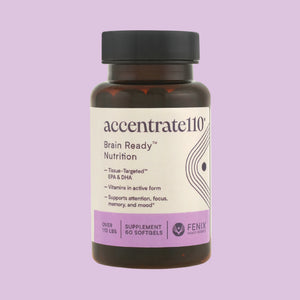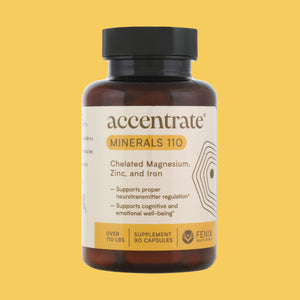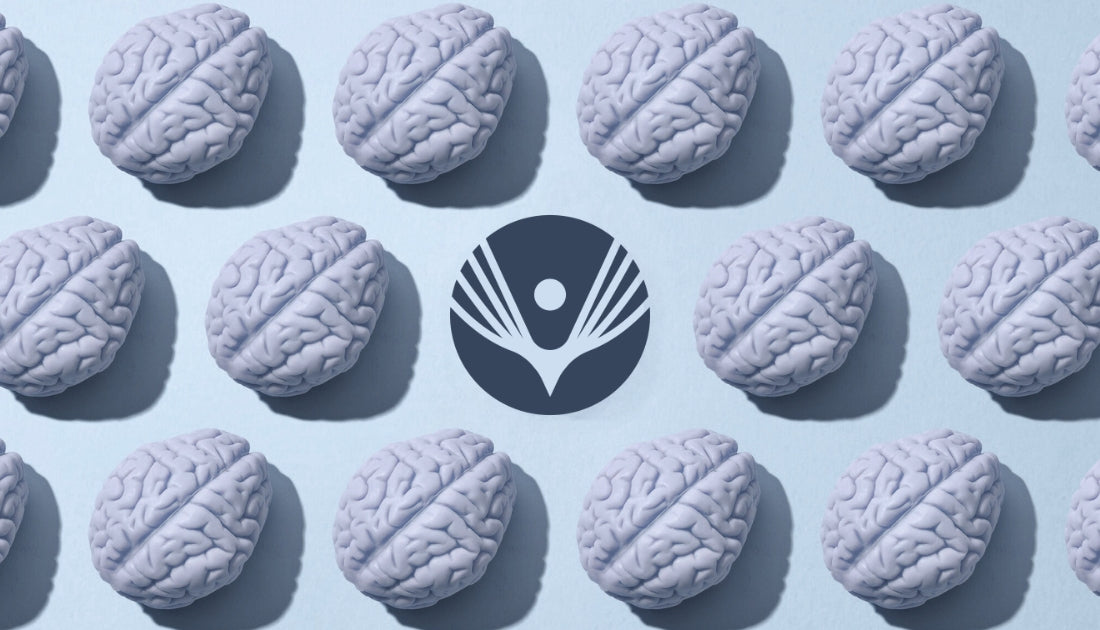Boost Your Health: The Benefits of Omega 3 and Vitamin B Together

Many people use single supplements to improve their overall health, but combining two or more can yield better benefits that are beyond what each one can offer on their own. One combination is omega-3 fatty acids and vitamin Bs. These nutrients support your brain function, cardiovascular health, and energy production. The benefits of this combination can't be overlooked; it is backed by clinical trials and real-world results.
Why Omega-3 and B Vitamins are Necessary Nutrients
Omega-3s and B vitamins are essential for brain health. Omega-3s support cell structure in the brain and nervous system and have anti-inflammatory benefits. B vitamins aid in red blood cell production, DNA repair, and other vital biochemical processes.
Omega-3 and vitamin B regulate neurotransmitter synthesis and homocysteine metabolism, which are necessary in achieving long-term wellness.
Quick Overview of Omega-3 and Vitamin B
Omega-3 fatty acids are a class of polyunsaturated fats that cannot be synthesized by the body but are important to human health. It contains three primary forms, which include eicosapentaenoic acid (EPA), docosahexaenoic acid (DHA), and alpha-linolenic acid (ALA). EPA and DHA are necessary for brain and nerve development and can be found in fish and fish oil. ALA is derived from plant sources like flaxseed, chia seeds, and walnuts, and must be converted in the body to EPA and DHA.
The B vitamin group is made up of eight water-soluble vitamins. Among them are B6 (pyridoxine), B9 (folic acid), and B12 (cobalamin), known for their impact on brain health, red blood cell formation, and DNA synthesis. These B vitamins work as cofactors in reactions that break down energy and make neurotransmitters. If you don't get enough of any of these, you could experience exhaustion, mood disorders, poor cognitive performance, and neurological degeneration.
B vitamins and omega-3 fatty acids support mental clarity, mood stability, and heart health, making them essential parts of a healthy diet.
What They Do in the Body, Separately
Omega-3 fatty acids (EPA and DHA) help build cellular structure by integrating into the phospholipid bilayer of cell membranes, enhancing their fluidity and function. This is necessary in neural tissue, where DHA, as an omega-3 fatty acid in the brain and retina, supports signal transmission, synaptic plasticity, and neuroprotection. Omega-3s reduce inflammation by shifting the production of eicosanoids and cytokines to less inflammatory forms. Furthermore, they contribute to cardiovascular health by lowering triglyceride levels, regulating blood pressure, and improving the function of the endothelium, the lining of blood vessels.
Vitamins B6, B9 (folate), and B12 act as coenzymes in key metabolic processes. B6 supports protein metabolism and the production of neurotransmitters like serotonin, dopamine, and GABA for mood regulation. Folate and B12 aid red blood cell formation, the methylation cycle, and help maintain healthy homocysteine levels—elevated levels are linked to cognitive and cardiovascular risks. Together, these B vitamins support brain and nerve development, protect the myelin sheath, and may support age-related cognitive decline.
How Omega-3 and Vitamin B Work Together
Omega-3 fatty acids and B vitamins have been shown through research to produce outcomes like improved cognitive performance, emotional regulation, and neurovascular health. Individually, they provide different health benefits, but their benefits are found in neural and cardiovascular function. (Smith et al., 2010)
B vitamins, particularly B6, B9 (folic acid), and B12, are important for the methylation cycle, a biochemical process that supports neurotransmitter synthesis and the regulation of homocysteine levels. Omega-3s, EPA and DHA, complement this process by improving membrane fluidity, cellular communication, and anti-inflammatory responses within the brain and nervous system.
Clinical trials have demonstrated that supplementation of omega-3 fatty acids and B vitamins can be more effective than either nutrient alone in preserving brain structure and function. For example, some controlled trials have shown that when plasma omega-3 levels are adequate, B vitamin supplementation slows brain atrophy in individuals with mild cognitive impairment. This shows that omega-3s increase the neuroprotective benefits of B vitamins. (Smith et al., 2010)
These nutrients support blood tissues and improve neurovascular activities, ensuring neurons receive the oxygen and nutrients they need during heightened activity. Omega-3s also assist the absorption of B vitamins at the cellular level, where energy production occurs, within neuronal mitochondria.
The action of omega-3s and the B vitamin group supports brain function, maintains the structural integrity of neurons, and increases the biochemical environment necessary for optimal brain health.
Benefits of Vitamin B and Omega-3
1. Fighting Inflammation Naturally
Omega-3 fatty acids have been shown to have anti-inflammatory properties; they reduce the production of cytokines and other inflammatory mediators. Vitamin Bs on the other hand, help regulate homocysteine levels and support antioxidant activity, resulting in calm inflammation.
2. Supporting Hormonal Balance
Omega-3s and B vitamins support hormone balance by regulating stress hormones like cortisol and aiding in the production of mood and reproductive hormones. They also support adrenal function and help manage stress.
3. Skin, Hair, and Nail Health Benefits
Omega-3 fatty acids improve skin elasticity, hydration, and reduce inflammation associated with conditions like acne and eczema. B vitamins, especially B7 (biotin), support cell regeneration and help maintain clear, healthy skin.
4. Cognitive Aging and Brain Protection
Omega-3 and vitamin B have neuroprotective properties, and they have been shown to help reduce the risk of Alzheimer's disease and slow down age-related cognitive decline. They reduce brain shrinkage and increase blood flow to important areas of the brain. (Smith et al., 2010)
5. Improving Sleep Quality
Omega-3s and B vitamins (particularly B6 and B12) increase serotonin and melatonin production and improve circadian rhythm and sleep quality.
6. Gut Health and Nutrient Absorption
Omega-3 fatty acids and vitamin B (particularly B12) impact the gut-brain axis. Omega-3 fatty acids have anti-inflammatory properties and can help reduce inflammation in the body. They also assist the gut microbiome. B vitamins contribute to gut lining health and digestion
7. Athletic Performance and Muscle Recovery
Omega-3s reduce muscle soreness, improve blood flow, and ease inflammation from injuries. B vitamins support red blood cell production, oxygen delivery, and energy metabolism, supporting athletic performance and recovery.
8. Support for Immunity All Year
Omega-3 fatty acids change the way the immune system works, lower inflammation, and help keep the lungs healthy. B vitamins, like B6, B9 (folate), and B12, are important for the growth and function of immune cells, which are needed to combat infections.
9. Mental Health and Mood
Evidence from many clinical trials showed the role of omega-3 fatty acids and B vitamin supplementation in improving mental health and emotional stability.
B vitamins such as B6, B9, and B12 are involved in the production of neurotransmitters - serotonin, dopamine, and GABA, which regulate mood and manage stress. Depression, irritability, and mental fatigue have been associated with a decline in these B vitamins. Furthermore, folate and B12 are important in reducing homocysteine, an amino acid that is connected to increased risk of depression and age-related cognitive decline when high.
On the other hand, omega-3 fatty acids (EPA) have been shown to have antidepressant and anxiolytic effects, due to their impact in calming inflammation and modulating the structure and function of brain cell membranes. (Grosso et al., 2014) Omega-3s improve signal transmission between nerve cells and the brain’s ability to respond to environmental and emotional stressors by supporting neuronal fluidity.
Together, these nutrients support a balanced neurochemical environment. Omega-3 may help neuroinflammation, which can affect neurotransmission, and it increases the action of B vitamins within the brain. This can improve concentration, help stabilize mood swings, and may lower the risk of long-term cognitive disorders like Alzheimer’s.
Heart and Circulatory Health
The cardiovascular system benefits from the individual and combined effects of omega-3 fatty acids and B vitamins, which influence our heart health and vascular function. These nutrients offer protection against cardiovascular risk and address different but similar physiological pathways.
Omega-3 fatty acids derived from fish oil supplementation, EPA and DHA, are known to reduce triglyceride levels associated with coronary artery disease. Omega-3s improve endothelial function, increasing the flexibility of blood vessels, beyond lipid management. This effect contributes to stable blood pressure and a reduced likelihood of endothelial dysfunction, a precursor to atherosclerosis. Furthermore, omega-3s help modulate heart rate changes and reduce systemic inflammation, which are important in long-term heart health.
B vitamins, folate (B9), and vitamin B12 are important for regulating homocysteine levels in the blood. High homocysteine is recognized as a major risk for atherosclerosis, stroke, and other forms of cardiovascular disease. Through the methylation process, these vitamins convert homocysteine into methionine, thereby reducing vascular inflammation and supporting arterial health. Studies have shown that lowering homocysteine through vitamin B supplementation can improve blood flow and reduce the incidence of cardiac events in individuals with high levels. (Spence, 2007)
The supplementation of omega-3 and B vitamins offers a cardiovascular support strategy. While omega-3s influence lipid profiles and vascular tone, B vitamins address underlying mechanisms of vascular damage at the molecular level. They contribute to a healthier circulatory system, which reduces the risk of cardiovascular diseases (CVD) and improves long-term outcomes.
Boosting Energy and Reducing Fatigue
One way you support sustained energy and vitality is by taking B vitamins and omega-3 fatty acids. These nutrients work on macro and micro levels in the body and mind, converting food into usable energy, improving mitochondrial function, and counteracting biochemical fatigue. (Huskisson et al., 2007)
The B vitamin group, B1 (thiamine), B2 (riboflavin), B3 (niacin), B5 (pantothenic acid), B6, B9 (folic acid), and B12, are important coenzymes in the metabolism of carbohydrates, proteins, and fats. These vitamins serve as catalysts in the Krebs cycle (known as the citric acid cycle), the central biochemical pathway for producing adenosine triphosphate (ATP), the body’s cellular energy currency. Without sufficient B vitamins, the body’s energy production will slow down, often leading to symptoms like chronic fatigue, muscle weakness, brain fog, and a reduced tolerance for exercise. (Huskisson et al., 2007)
Vitamin B12 and folic acid are also involved in red blood cell production. Inadequate levels can result in megaloblastic anemia (a condition caused by poor oxygen transport to tissues, physical exhaustion, and cognitive sluggishness).
Omega-3 fatty acids, particularly EPA and DHA, work alongside B vitamins to support mitochondrial efficiency and protect cells from oxidative stress. Since mitochondria produce most of the body’s ATP, their health is key to sustaining energy during mental or physical effort. DHA also helps maintain membrane fluidity in mitochondria, enhancing their ability to generate energy.
Together, B vitamins and omega-3s provide synergistic support for energy metabolism. Omega-3s protect the cellular environment, while B vitamins drive the biochemical reactions that change nutrients into usable fuel. This nutritional combination is beneficial for individuals under high levels of mental stress, recovering from illness, or coping with age-related declines in metabolic efficiency. By ensuring adequate intake of these nutrients, individuals can reduce fatigue, support endurance, physical performance, and mental clarity.
Natural Sources vs. Supplements
A balanced diet provides omega-3s, B vitamins, and other nutrients that enhance their absorption and effectiveness. Natural food sources of omega-3 fatty acids include oily fish such as salmon, mackerel, sardines, and anchovies, which are rich in the biologically active forms EPA and DHA. These marine-derived omega-3s are highly bioavailable and have been shown to improve blood triglyceride levels, reduce inflammation, and support brain and nerve development. Plant-based sources, such as flaxseeds, chia seeds, walnuts, and hemp seeds, contain ALA (alpha-linolenic acid), which the body must convert into EPA and DHA. However, this conversion process is inefficient, often yielding less than 10%, making it more challenging for those on plant-based diets to meet their omega-3 needs without supplementation.
For the B vitamin group, foods containing vitamin B include leafy greens (spinach, kale), legumes (lentils, chickpeas), eggs, poultry, red meat, and fortified cereals. Each food type contributes a specific subset of B vitamins - leafy greens are rich in folic acid, and animal products are sources of vitamin B12. Because B vitamins are water-soluble and the body doesn’t store them in large quantities, they must be consumed regularly through diet or supplementation.
That said, diet alone is not always sufficient, especially for certain populations. Older adults often have impaired absorption of vitamin B12 due to reduced gastric acid production. Vegans and vegetarians may lack adequate intake of both B12 and omega-3s (EPA and DHA). Pregnant and breastfeeding women have higher nutritional demands that are difficult to meet through diet alone. In such cases, high-quality supplements can be crucial for maintaining nutrients and preventing health issues.
When selecting supplements, it is important to choose products that are:
-
Third-party tested for purity, potency, and the absence of heavy metals or contaminants (especially in fish oil products).
-
Formulated with adequate amounts of EPA and DHA, in triglyceride or phospholipid form for improved absorption.
-
Designed with methylated B vitamins (such as methylcobalamin and L-methylfolate), which are more effective, particularly for individuals with MTHFR genetic variants who may struggle to metabolize folic acid.
Ultimately, while foods should remain the foundation of your nutrient intake, supplementation can help correct deficiencies and improve health outcomes in individuals.
To experience the full range of health benefits from these nutrients, consider exploring Fenix Health Science’s omega and neuro products. Combining the power of omega-3 and B vitamins, these formulated solutions support brain health and overall vitality.
Who Needs These Nutrients Most?
-
Older adults who struggle with vitamin B absorption
-
Vegan and vegetarians who lack both omega-3 and B12
-
Pregnant women
-
People experiencing age-related cognitive decline, chronic stress, or mental health issues
-
Infants who need support in their brain and nerve development
How to Add Them to Your Diet
The daily intake differs. Generally, 250–500 mg of combined EPA and DHA is a good target for omega-3. While general recommendations suggest 250–500 mg of combined EPA and DHA per day, Lysoveta® delivers omega-3s in LPC form, which is more efficiently absorbed by the brain. As a result, lower doses may achieve brain-targeted benefits comparable to or greater than higher doses of traditional fish oil. For B vitamins, the needs range from 1.3 mg for B6 to 2.4 mcg for B12 daily. These with other nutrients like magnesium and zinc can increase absorption and further support brain health.
Always consult with a healthcare provider prior to beginning a new regimen, especially for high-dose supplementation.
Common Myths About Omega-3 and B Vitamins
A common myth is that diet alone provides enough omega-3s and B vitamins, but modern diets often fall short. Another misconception is that all supplements are equal—effective ones need the right EPA/DHA ratios and bioavailable B vitamin forms.
Another is that all omega-3s are the same. The omega-3s most relevant to brain health are the polyunsaturated fatty acids EPA and DHA, and not all EPA and DHA supplements have the same impact on the body. Triglyceride forms may be better for heart health and overall wellbeing, while DHA and EPA in LPC form or as phospholipidids better support brain health.
Signs You Might Be Deficient
Brain fog, fatigue, dry skin, hair loss, poor memory, and mood changes are signs that you might be deficient. Testing and professional consultation are important as deficiency symptoms might be subtle. Healthcare providers will assess vitamin status through blood tests, especially for older adults or those with dietary restrictions.
Conclusion
Omega-3 fatty acids and B vitamins are important to our health. Each nutrient supports the brain, heart, immune system, and energy levels, creating a synergy that increases cognitive performance and supports emotional well-being. The benefits range from protecting against age-related cognitive decline to supporting skin health and muscle recovery.
If you're looking to improve mental clarity, manage stress, or simply feel more energized day to day, consider adding these nutrients to your routine. With the right combination of nutrient-rich foods and high-quality supplementation, you can improve the quality of your brain health.
Learn even more about brain health in our blog about APOE alleles.
References
Grosso, G., Galvano, F., Marventano, S., Malaguarnera, M., Bucolo, C., & Drago, F. (2014). Omega-3 fatty acids and depression: Scientific evidence and biological mechanisms. Oxidative Medicine and Cellular Longevity, 2014, 313570.
Huskisson, E., Maggini, S., & Ruf, M. (2007). The role of vitamins and minerals in energy metabolism and well-being. The Journal of International Medical Research, 35(3), 277–289.
Smith, A. D., Smith, S. M., de Jager, C. A., Whitbread, P., Johnston, C., Agacinski, G., ... & Refsum, H. (2010). Homocysteine-lowering by B vitamins slows the rate of accelerated brain atrophy in mild cognitive impairment: a randomized controlled trial. PloS One, 5(9), e12244.
Spence, J. D. (2007). Homocysteine-lowering therapy: a role in stroke prevention? The Lancet Neurology, 6(9), 830–838.
These statements have not been evaluated by the Food and Drug Administration. This product is not intended to diagnose, treat, cure, or prevent any disease.




